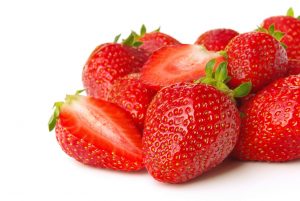Scientists to develop first strawberry varieties for U.S. organic production

Scientists at the U.S. University of New Hampshire (UNH) have launched a research project that aims to develop the first varieties of strawberries specifically designed for organic agriculture in the country.
The varieties will be developed using advanced genetic techniques for optimal production in New England, which encompasses the six states in northeastern U.S.
UNH is recognized as one of a small number of institutions worldwide working at the forefront of strawberry genomics and its application to strawberry breeding.
"No strawberry varieties yet have been developed specifically for organic agriculture in the U.S., and only one company located in Europe offers any strawberry seed-propagated varieties specifically for organic production,” said experiment station researcher Dr. Lise Mahoney, who is leading the three-year project.
“This project will contribute to advances in strawberry breeding for organic agriculture and will advance knowledge of the genetic basis for trait variation, inbreeding depression, and hybrid vigor in strawberry.”
She said the researchers wanted to provide strawberry growers with regionally adapted, seed-propagated strawberry varieties that are suitable for organic agriculture and are pleasing to consumers.
"Organically certifiable, seed-propagated varieties provide an attractive and environmentally friendly alternative to the vegetatively propagated varieties currently relied upon by the strawberry industry,” Mahoney said.
The research project has received strong support from Driscoll’s and High Mowing Organic Seeds, a leading developer and producer of organic seeds.
“Organic berry production makes up well over 10 percent of the Driscoll's berry portfolio making Driscoll's one of the largest providers of organic berries in the United States," said Richard Harrison, vice president of global variety development for Driscoll’s
"Organic strawberries are one of the fastest growing segments within our business. We see strong potential for this market well into the future. A seed-propagated strawberry variety would provide an excellent way to delivery clean plant material to growers at an affordable price."
High Mowing Organic Seeds founder Tom Stearns said: "It is refreshing to witness research thinking outside the box with respect to strawberry varietal development and propagation method.
"Seed varieties in strawberry, particularly those selected in an organic environment, would provide a valuable and needed option to vegetatively propagated plants.
"Strawberry hybrid seed varieties and furthermore, seeds that are bred in an organic environment, would open an intriguing new market for us."
Experiment station researchers plan to produce both day-neutral and short-day flowering strawberry varieties for organic agriculture that can be propagated by seed rather than by the conventional runner plant approach.
According to Mahoney, strawberries typically are propagated vegetatively from runners and purchased by growers as bare-root plants. However, this bare-root production method presents major problems in regards to organic agriculture.
First, the process of generating the bare-root plants requires chemical inputs to avoid transmission of diseases. Second, the grower planting schedule is dictated by the bare-root supplier and therefore planting stock availability is seasonally limited according to the purchaser's climatic region.
Mahoney and her collaborators, including Dr. Tom Davis, professor of genetics, molecular and evolutionary systems biology, and sustainable agriculture and food systems, and Dr. Becky Sideman, professor of plant biology and extension professor and specialist in sustainable horticulture production, will use an advanced breeding method called marker-assisted breeding.
Marker-assisted breeding allows scientists to conduct traditional cross-hybridization and trait-based selection using genetic testing. Mahoney and Davis will conduct the genetic testing using the IStraw90 SNP Array, which they helped develop.
The research will be conducted at the UNH Macfarlane Research Greenhouses and Woodman Horticultural Research Farm, both facilities of the NH Agricultural Experiment Station.
Preliminary research for this project was conducted at the two facilities earlier this year.
Photo: www.shutterstock.com




































